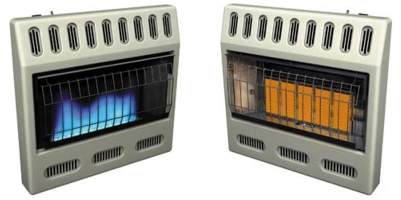|
Ventless Propane Heater, The Pros and Cons of Indoor Propane HeatersA ventless propane heater has a number of advantages. It doesn't require a chimney or flue, or any sort of permanent, fixed vent. Since it is not vented to the outside, one can be installed and used almost anywhere. Because none of the warmth escapes through a vent or flue, most indoor propane heaters are approximately 99% efficient. They don't require electricity to operate, so they will work during a power outage. Some units are portable, and can be moved from place to place as needed. Propane is also readily available and not terribly expensive in many areas of the US.
There are several different designs on the market. The first distinction is between portable units and stationary units. I have covered the portable type in my page on portable propane heaters (see the link on the right), so I will cover the stationary units here. There are two main types of stationary ventless propane heaters. A blue flame heater has visible blue flames and it warms the air as the fuel burns. The heat is distributed through convection. A radiant propane heater has ceramic plaques that are heated by the burning fuel. The plaques turn a bright orange and emit infrared heat that warms the objects in a room, just like the sun.
Blue Flame Heater and Radiant Propane Heater
A stationary indoor propane heater is usually self-igniting, eliminating the need to use matches. Most use a push button piezo-electric igniter that works like the igniter on your gas barbecue grill. Some units come with thermostats to maintain a consistent room temperature, but most of the less expensive units have manual temperature controls. A thermostatically controlled blower is an option on some propane space heaters. Indoor propane heaters are not designed to be the primary heat source in a home. They should be used to supplement an existing heating system, or for zone heat so you can turn the thermostat down. However, they can work well to warm up a garage that is not heated full time. They can be found in a variety of sizes, ranging from 5,000 to 40,000 BTUs. A ventless propane space heater isn't appropriate for all situations. There are some considerations to keep in mind when deciding if a ventless propane heater is a good choice for you. One thing to keep in mind is that water vapor is a natural byproduct of the combustion process. An indoor propane heater will increase the humidity in the space where it is used. This is not a problem in most cases, but if moisture is already an issue in your home or garage, a ventless propane space heater will add to it. A high humidity level promotes mold and mildew growth, and of course can rust that fender you sanded down to bare metal and left sitting in the corner of the garage!
All indoor propane heaters require oxygen, and the combustion process uses up the oxygen that is in the air. For this reason, you are required to have at least one square inch of fresh air opening for every 1000 BTUs of gas that are used by any appliance in the space, including water heaters or cooking appliances. Most homes and garages are not sealed well enough for this to be an issue, and have enough air leaks around windows and doors to take care of ventilation. However, propane space heaters were responsible for a few deaths in the 1970s due to asphyxiation. This caused them to be outlawed in some areas. All ventless indoor propane heaters sold in the US since 1980 are required to have an oxygen depletion sensor (ODS), which shuts off the fuel supply if the oxygen level in the air falls below about 18%. Ventless propane heaters are still illegal in some areas though, including California. If you live above 4500 feet in elevation, you have to be careful when choosing a ventless propane space heater. Because of the oxygen depletion sensor, the pilot light on some propane gas heaters will not stay lit reliably at higher elevations due to the thinner air. If this applies to you, make sure to look in the owner's manual for any high-elevation warnings before you make a purchase. Owners manuals can usually be found on the manufacturer's website, and sometimes even on the Amazon sales page. One last thing to be aware of is that the fuel tank should never be stored indoors. If it develops a leak, the gas will "pool" on the floor, and a spark could make your whole home or garage go "boom"! This means that with a stationary unit you will need to run a gas line through the wall to a tank that is outside. A ventless propane heater is a great choice for many applications. They are clean, efficient, and hassle free. They are generally cheaper to operate than electric heat, and are much easier to install than a vented heater. As long as your space has enough ventilation and you don’t live halfway up Pike's Peak, a propane space heater can provide economical supplemental heat for your home or occasional heat for your garage. There are many different styles to choose from. There are free-standing units, wall-mounted units, and units that even look like a wood stove or a fireplace! There are lots of owner reviews on Amazon For more information on other types of heaters, go to our Related Pages menu on the right near the top of this page.
Return from Ventless Propane Heater to Garage Heating
|

Related Pages
on this site:
Garage Heating
Electric
Natural Gas
Propane - Convection
Propane - Radiant
Portable Propane
Ventless Propane
Radiant Tube
Wood Burning
Oil Filled
Waste Oil Furnaces
Waste Oil Heater Plans
Radiant Floor Heating System
Electric Radiant Floor Heat
Hydronic Radiant Floor Heat





